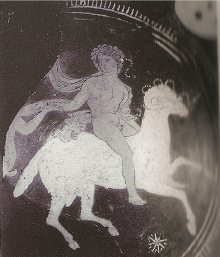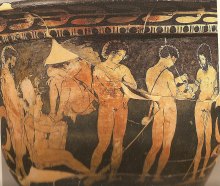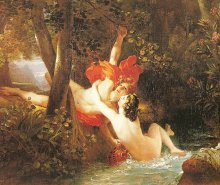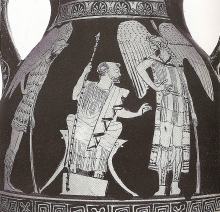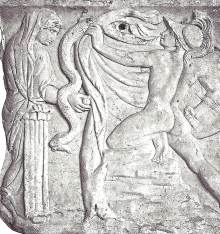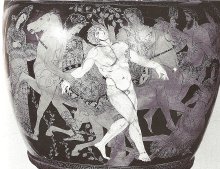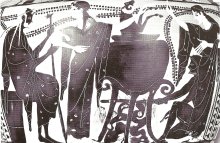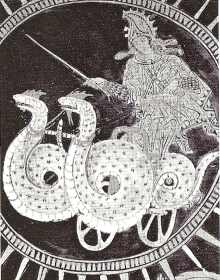Jason, the Argonauts and the quest of the Golden FleeceThe story of Jason and the Argonauts talks about a great journey by water to a far away land eastwards of Greece. According to myth, the purpose of this journey was to find and bring back the golden fleece of a ram which was kept in that far away land. The story of the journey is described in a long poem entitled "The Quest of the Golden Fleece", written by the poet Apollonius of Rhodes, who lived in the third century B.C. Actually, the poem ends with the return of the heroes to Greece. What happened afterwards, that is the story of Jason and Medea, is described in the play "Medea" written by the famous playwright Eurypides.
"Beware of the one-sandaled man" Ready to sail, on board the Argo Arriving at the island of Lemnos Encounter with the clashing rocks Confronting Aetes, the mighty king of Colchis More adventures on dangerous waters The final act of an epic story
How it all started
The tale of the Golden Fleece begins when Athamas, king of Orchomenus, had left his wife Nephele, to marry Ino, who was a daughter of Cadmus, the legendary king of Thebes. In order to secure that her own son would inherit the kingdom, Ino plotted the destruction of Athamas'son, Phrixus and his daughter Helle. To that end, she damaged all all of the seed grain in the kingdom. When the crops failed, messengers were sent to the Delphic oracle for guidance. Ino then bribed the returning messengers to change the oracle: Phrixus must be sacrificed! Athamas reluctantly agreed to heed the false oracle. But just as he raised the knife over his son on the altar, a wondrous, golden winged ram appeared, taking both Phrixus and Helle on his back to carry them away. While they were crossing the strait which separates Europe from Asia, the girl slipped and fell into the water. She was drowned; and the strait was named after her Hellespont (Sea of Helle). The boy came safely to land to the country of Colchis on the Black Sea. Although the Colchians were fierce people, they were kind to Phrixus and their king, Aetes, let him marry one of his daughters. In gratitude to god Zeus for having being saved, Phrixus sacrificed the ram and gave his golden fleece as a present, to king Aetes. [top] The story of JasonJason was the grandson of Tyro and her uncle Cretheus. Being the eldest son of Tyro, Jason's father, Aeson, should have inherited the kingdom of Iolcus, a seaport in Thessaly (northeastern Greece), which Cretheus had founded.But Tyro, had also twin sons by the god Poseidon and one of these twins, Pelias, had seized the throne. Aeson feared for his life and that of his unborn son. So, when his wife Polymede gave birth to Jason, Aeson claimed that the baby had died at birth. He entrusted the boy to the care of Cheiron, the wisest of the centaurs, who had also tutored Hercules. [top] "Beware of the one-sandaled man"When he reached manhood, Jason set on his journey to Iolcus, to claim the throne that was rightfully his. Before he reached the city, he came to the river Anaurus, where he met an old woman who was trying to cross the river.When he gallantly volunteered to carry her on his shoulders, he lost one of his sandals which got stuck in the mud of the river bed. After putting the old woman down, he sped off to Iolcus. What Jason did not know was that the old woman was actually goddess Hera, who hated Pelias, because he never offered her any sacrifices, or paid her any respects. As the story unfolds,it will be shown how the goddess was planning to take her revenge by helping Jason along. Pelias soon heard of the one-sandaled man who had arrived in the city. This news frightened him, for an oracle had once warned him that a man with one sandal would some day cause his death. Right away, Pelias sought to confront Jason and demand from him to reveal his identity. Jason had no hesitation to answer the truth, announcing his intention to reclaim the city's throne either for his father, or for himself. Pelias wanted to kill his nephew right away, but he knew that would not be very wise, as he would violate the laws of hospitality and thus incur the wrath of the gods. So, looking for another way to dispose of him, he assigned him an impossible task: To go and retrieve from Colchis, the golden fleece! If Jason was successful, he promised that he would immediately return the throne to him. The young hero, without hesitation, immediately jumped on his uncle's challenge: He agreed and immediately set off to plan his epic journey. [top] Assembling the crew
After consulting the oracle at Delphi, Jason invited the most daring noblemen from all over Greece, to join him. The roster of those accepting his invitation,was truly impressive: It included the top of the cream of all the brave heroes that lived at the time. Some of these, were the following:
In addition to those who claimed divine birth, the ambitious recruits included also Tiphys, who was assigned to be the pilot of the ship, as well as the brothers Telemon and Peleus. The latter would later marry the sea goddess Thetis and beget Achilles, the greatest hero of the Trojan War. [top] Ready to sail, on board the ArgoJason's crew named themeselves the Argonauts, after their magnificent ship, the Argo. This was built under the watchful eye of goddess Athena, who according to myth, had taught humans about the art of sailing the seas. The ship's beams came from Mount Pelion in Thessaly and included a talking beam from the oaks of the Oracle at Dodona. From this beam, the Argonauts would receive advice during their long journey.After offering a traditional sacrifice to Apollo, the argonauts set sail for Colchis. [top] Arriving at the island of LemnosMidway across the northern Aegean Sea, the argonauts arrived at the island of Lemnos. The strange thing about this place was that the only inhabitants were women.Year earlier, the women of Lemnos had failed to honor the goddess Aphrodite properly. To punish them, the goddess had given the women a horrible odor which drove their men away, seeking refuge in Thrace. There, they raided the area and brought back with them to Lemnos female captives, with whom they began having children. Enraged, the native women of Lemnos killed all their female adversaries, as well as all the men. When the argonauts set their foot on the island, the women saw them as their potential lovers and lured them into their bed chambers. Jason himself mated with their queen, Hypsipyle. The argonauts were finally convinced to leave the island and continue their journey, only when Hercules, who remained on board Argo, sent a message questioning them whether this was the way they wanted to gain glory for themselves. [top] More adventures on the way
After Lemnos, the argonauts made a stop at the island of Samothrace, where they were initiated in the Samothracian Mysteries, religious rites that they hoped would help them in their journey. Their next adventure was in an island at which they made a stop after they passed the Hellespont and entered the Sea of Marmara. There, while they were being greeted on land by the natives who welcomed them, their ship was attacked by fierce giants. Fortunately, Hercules, who was left on board the ship as one of the guards, managed to beat them single handedly. Once the crew set sail again, they were forced to stop in Mysia, (northwestern Asia Minor), when Hercules broke his oar. However, when they were on land, Hercules lost his young companion Hylas, who was abducted by a river nymph, while he was gazing inside the river waters. While Hercules and a fellow member were in vain searching for the lost youth, the Argonauts set sail and left without them, prompted by the sea god Glaucus to leave the hero behind, as Zeus intended him to complete his labors. [top] Encounter with the clashing rocks
At the southern end of the Bosporus, they stopped in Salmydessus, a land ruled by Phineus, whose wife was a sister of Zetes and Calais, the twin winged sons of Boreas. They found the king starving, filthy, blind and so weak he could hardly move. Zeus had sent the Harpies, horrible creatures, to punish him, because, being a prophet, he had disclosed sensitive information about the future to the humans. The Harpies, would steal his food and pollute whatever they left behind, with a terrible stench. The argonauts prepared some food for Phineus to set a trap for the Harpies. When they appeared, stole the food and set off, the winged brothers pursued and caught them. Just then, Iris, Zeus' messenger, descended from Olympus. If the twins spared the Harpies, Zeus promised they would leave Phineus alone. Zetes and Calais reluctantly released the Harpies, and returned to Salmydessus. Phineus was so grateful, that he foretold some of what the future held for the argonauts. Most importantly, he offered valuable advice on how to navigate the treacherous Clashing Rocks ("Sympligades" in greek) at the eastern end of the Bosporus; the entrance to the Black Sea. These two enormous floating islands, driven by the wind, crushed everything in their path as they smashed against each other without warning. As the Argo neared the end of the Bosporus, following Phineus' advice, the argonauts released a dove that flew directly between the Clashing Rocks. Phineus had told them that if the dove could make it through the strait, so would Argo. The rocks clashed together, but the dove only lost a couple of feathers. So, when the rocks separated again, the 50 argonauts rowed with all their might: Like the dove, the ship made it almost all the way, losing only an ornament from the stern. The Clashing Rocks parted once more and with spell broken, they remained forever apart.
[top] Confronting Aetes, the mighty king of ColchisThe Argo soon entered the mouth of the river Phasis, where Aea, the capital of Colchis lay.The king Aetes being so poweful, Jason and the argonauts needed all the help they could get from their divine allies, Hera and Athena. When Jason sought their help, they agreed that they would bribe Eros, the winged god of love, with a golden ball to wound the heart of Aetes' daughter, Medea. For, if Medea, a powerful witch, would assist them, even to the point of betraying her father, Jason and the argonauts would have a chance to win the Golden Fleece. A priestess of the Underworld goddess Hecate, Medea was the first in Colchis to see the argonauts. Smitten by Eros, she instantly became infatuated with Jason. The next day, when the argonauts went to meet the king, he was not so pleased to meet them and when Jason asked him for the fleece, he proposed a test of strength to him. If he would be successful, then he would gladly hand over the fleece to the Greeks. Like the test Pelias had set for Jason, this one too seemed impossible: He would have to harness a pair of fire-breathing bulls to a plow, sow a field with dragon's teeth and then kill all the men who sprang from this seed. Having accepted the challenge, Jason later met with Medea for the first time at dawn, in the shrine of Hecate at Colchis. There, he made her a solid promise that, should she help him, he would take her back to Iolcus with him and honor her forever. The next morning, before undertaking the test, Jason anointed himself and his weapons with a magic drug that Medea had given him. With the drug protecting him from the flames, the young hero forced the bulls to their knees and quickly harnessed them. Within a few hours, he had sown the entire field with the dragon's teeth. When the armored men sprang from the earth, Jason hurled a big stone among them, thus starting a fight among themselves. In the resulting confusion, he then rushed in with his sword gleaming, and started swinging it. By nightfall, all the fierce warriors had been slain!
[top] The escape from Colchis
Despite Jason's triumph, Aetes did not intend to keep his promise and he started plotting against the argonauts instead. Medea, who knew of her father's vicious plans to get rid of the Greeks, she quickly went to meet Jason and tell him that she was ready to help him steal the fleece and then sail away with him, away from her father. Hearing her words, Jason followed Medea to the place where the fleece was kept under the watchful eye of a terrible dragon who never slept.When the beautiful sorceress used her magic to cause the sleepless beast to nap, Jason managed to snatch away the fleece from the tree branch that was hanging. Running back to Argos, they sailed fast, away from Colchis. Learning of the theft, Aetes quickly set his son Apsyrtus and a flee tof worships against them. Half the fleet headed for Bosporus; the other half for the mouth of the Danube. Though the Argo had made for the Danube as well, Apsyrtus arrived there before them. The argonauts soon found themselves trapped: A Colchian ship guarded the entrance to the Danube river. They took refuge on an island sacred to Artemis where they knew that Colchians would never dare launch an attack that might offend the goddess. [top] Medea kills her brotherSending him a message claiming that she had been abducted, Medea lured her brother to a meeting on the island, where Jason ambushed and killed him. Then the argonauts killed everyone on Apsyrtus' ship and fled towards the Danube.According to another version of the myth, the horrible deed of Medea to cause her own brother's death, was even worse: Apsyrtus was just a child who ran away with his sister on the Argo. Jason and Medea then killed the innocent boy, dismembered him and tossed his body parts into the sea. This act forced the Colchian ships to call off the chase, in order to collect the poor boy's remains for burial. God Zeus, infuriated by Medea's horrible act of betraying her brother, brewed up a storm and ordered the evil doers to seek purification for the murder from Medea's aunt Circe, who lived on an island off the western coast of Italy. [top] More adventures on dangerous waters
Rather than finding an outlet to the sea and sailing all the way around the southern coasts of Greece and Italy, the Argo chose a circuitous route of inland rivers to cross northern Greece and Italy. After making its way to the western Mediterranean, the ship finally sailed on to Aeaea, the island of Circe. Without asking any questions, Circe purified Jason and Medea with the blood of a pig and made sacrifices to both Zeus and the Erinyes (Furies). But, when Circe found out who they were and how Medea had betrayed her father and her fellow country men, she angrily chased them off the island. To their good fortune, however, Hera was again there to help them. The goddess ordered favorable winds from Aeolus, the keeper of winds, and asked the sea goddess Thetis for help, too. As they approached Anthemoessa, home of the Sirens, whose seductive singing had caused so many sailors to abandon their voyages and slowly waste away from hunger, Orpheus began to sing and play with his lyre as loudly as he could. By drowning out the alluring singing of the sirens, Orpheus saved the argonauts. To reach the Ionian Sea, west of Greece, the Argo still had to navigate the narrow strait between the cliff of Scylla, a six-headed beast that preyed on sailors from a sea cave, and the whirlpool of the monster Charybdis. But, Thetis secretly took the helm and steered them safely through. The Nereids then safely skiimed the Argo over the surface of the water around Sicily. This prevented the violent currents from carrying them into the Wandering Rocks - moving rocks that destroyed ships attempting to pass among them. After crossing the Ionian Sea, the argonauts reached the greek island of Drepane (probably the same as Corfu today). Here, to theit great surprise, they met with othe other half of Aetes' fleet, who had been after them all along. The Colchians demanded the immediate return of Medea and the golden fleece. The argonauts then sought help from the local king and queen, Alcinous and Arete. They agreed to protect them from the wrath of the Colchians on one condition - Jason and Medea had to get married. So, the crew performed the marriage rites that very night in the sacred cave of Macris. From then on, the cave was known as the Medea's cave. The next morning, the king of Drepane informed the Colchians that he would not allow them to take Medea from her new husband. The argonauts then were free to go. Just as the Argo reached the southern coast of Greece, a strong wind blew them all the way across the Mediterranean Sea to the Libyan coast. An enormous wave then deposited the ship far inland, leaving it stranded on the desert sands. With the help of three nymphs who appeared before them, the argonauts managed to put Argo on rollers and carry her across the desert for nine days. Whey they arrived at the salt water lake Tritonis, the argonauts went out to search for fresh water. On their expedition, they found the Garden of Hesperides, where the nymphs informed that, after stealing their apples, Hercules had created a fresh water spring. After returning to Argo, the crew searched for days but could not find an outlet from Tritonis to the sea. After making a plea to god Triton, he finally responded, pushing the ship all the way to the Mediterranean. After the long journey across the sea, the argonauts arrived at Crete. But the giant Talus prevented them from landing, by hurling giant rocks at them. The last of the giants of the bronze age, Talus was invulnerable - except for one vein near his ankle. Medea used her sorcery to hypnotize the giant, who stumbled, banging his ankle against a sharp rock. The vein burst and the giant fell dead in the sea. [top] The return home
While Jason was far away on his mission, rumors began spreading in Iolcus that ship and her crew had all been lost. Pelias, encouraged by this news, forced Jason's father Aeson to commit suicide by drinking bull's blood, which was a fatal toxin. Then, Pelias killed Jason's younger brother Promachus. Jason's mother, in her desperation, killed herself with a sword. Finding out about the horrible deeds that his uncle had committed against his family, Jason docked Argo outside the city, while Medea came up with a horrible scheme to seize the throne from Pelias. She disguised herself as a crone and entered the city. After claiming that Artemis had sent her to restore Pelias's youth, she finally convinced Pelias to submit himself to her promised "treatment". The spell, Medea said, required the cooperation of Pelias's daughters. Reluctant at first, they finally consented to Medea's dreadful recipe: They cut up their father into pieces and put his body parts into a cauldron to stew. With Pelias out of the way, the argonauts quickly seized control of the city. However, Jason's shipmate and son of Pelias, Acastus, who succeeded his father to the throne, expelled Jason and Medea from Iolcus, disgusted by the way that his father was killed. The couple then sought refuge in Corinth after an invitation extended to them by the local people.
[top] Medea's dreadful revenge
Jason and Medea settled in Corinth, where they had two children. As the years passed by, Jason increasingly found Medea, whom the Corinthians hated and were afraid of, an embarrassment to him. So, when king Creon of Corinth offered him the hand of his daughter Glauce, Jason eagerly accepted. Divorcing Medea and marrying the king's daughter, would add to his own power and prestige, as well as ensure the citizenship rights of his children. But, he was unaware, what Medea would do in retaliation to his betrayal. Betrayed, divorced and then exiled by Creon, Medea took advantage of her final day in Corinth to send Clauce a robe and a crown for her wedding, as a gift. When the naive Glauce tried on the robe, which Medea had drenched in poison, it burst into flames. The fire consumed not only the poor girl, but also the entire family of Creon and the palace. To hurt Jason even further, Medea killed her own children. Leaving Iolcus, she even took their bodies with them,so that Jason would not be able to bury them. The evil sorceress escaped Corinth on a chariot pulled by dragons, a gift from her grandfather Helius. [top] The final act of an epic storyMedea fled to Athens, where she convinced king Aegeus, who later became the father of Theseus, to marry her by promising him children.Aegeus and Medea, who had a son named Medus, lived in Athens for many years. However, when she tried to kill Theseus to clear a path for her own son, Medea and her son were exiled by Aegeus. With nowhere else to go, Medea returned at last to her homeland of Colchis. There, Medus, prompted by his mother, killed king Perses who in the meantime had dethroned his brother Aetes. Medus thus captured the throne for himself. From them on, no one knows what became of Medea. As for Jason, he did not have a very glorious ending: When he became old, he tried to visit the wreckage of Argos, in the hope of rekindling his memory of the past glory days that he and his fellow argonauts had once lived. While he was there, a beam from the rotten ship fell upon his head, striking him dead.
Return from Jason and the Argonauts to Greek Myths
|
||||||||||
Resource MaterialClassroom MaterialMovies,DVDs, Games and BooksAbout the SiteYour Stories |
||||||||||
|
|
||||||||||
